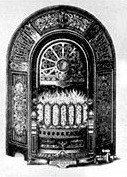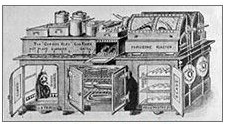 An Early Gas Fire
An Early Gas Fire
 Early Gas Cooker
Early Gas Cooker
circa 1895
The development of electricity and the advent of the electric lamp in about 1880 created a serious rival to gas in its main market of lighting. The invention of the gas mantle by Carl Auer von Welsbach enabled the industry to match electricity for lighting from the 1890's. While gas lighting was still in use domestically and for street lighting until after World War II, the decline in the lighting load was established and the use of gas for heating purposes accelerated.
The arrival of electricity forced the domestic gas market to expand into other areas; geysers provided hot water, fires provided instant heat and with approval from the world of medicine, a government commission and Mrs Beeton gas cooking took off both in the domestic and commercial environment. Showrooms offered an even wider range of domestic appliances including gas irons, baths, fridges and coffee roasters.
The latter part of the nineteenth century was a time of consolidation with small undertakings being taken over by larger neighbours and local authorities buying out their local supply company - municipal gas undertaking profits were a major source of income for local authorities operating them. Complaints of excess profits by gas companies lead to the introduction of the 'Sliding Scale' which linked increases in dividends to reductions in the price of gas.
Growth and consolidation of the gas industry was paralleled by an upsurge in discontent of the workers. The first union for non-skilled workers came into being when the Gas Workers' Union was founded in 1889; its first major achievement was the eight hour day.
Attempts to form gas manager's associations eventually led to the to establishment of the Institute of Gas Engineers in 1903. Impressed and alarmed by the power of the new unions, George Livesey introduced a new system of profit sharing giving workers an interest in the success of the companies they worked for, with benefits of cash bonuses and cheap gas. Co-partnership as it became known spread throughout the industry.